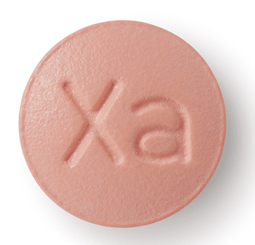
The COMPASS study, which was presented at the European Society of Cardiology (ESC) congress (26–30 August, Barcelona, Spain), has shown that rivaroxaban (Xarelto, Bayer) 2.5mg twice daily, plus aspirin 100mg once daily, is associated with a 24% relative risk reduction in cardiovascular death compared with aspirin 100mg once daily alone in patients with coronary artery disease and those with peripheral arterial disease.
The study, was has also been published in The New England Journal of Medicine, compared a combined approach of aspirin 100mg plus rivaroxaban 2.5mg twice daily with aspirin 100mg once daily alone. Patients included in the study were already receiving guideline-recommended therapy for hypertension, high cholesterol and diabetes. A 5mg twice daily dose of rivaroxaban was also investigated but did not reach statistical significance.
The topline results were that rivaroxaban 2.5 mg twice daily plus aspirin 100mg once daily:
- Was superior to aspirin 100mg once daily alone for the prevention of the composite endpoint of stroke, cardiovascular death and myocardial infarction (primary efficacy outcome)
- Significantly reduced the risk of stroke by 42% and cardiovascular death by 22%
- Demonstrated a 20% improvement in net clinical benefit (defined as the reduction in stroke, CV death, and heart attack balanced against the most serious bleeding events)
- Reduced the risk of myocardial infarction by 14%, but this was this result was not statistically significant.
Overall bleeding incidence rates were low and while there was an increase in major bleeding with the combination of rivaroxaban and aspirin, there was no significant increase in fatal or intracranial bleeding. Also, in the peripheral arterial disease patient population, the combination of major adverse limb events plus all major amputations of a vascular cause were reduced significantly.
COMPASS trial investigator, Derek Connolly (Birmingham City Hospital, Birmingham, UK), says: “The results of the COMPASS trial exceeded all expectations, demonstrating efficacy in reducing serious cardiovascular events that was so compelling we offered the treatment to study participants in an open-label extension trial. This study further builds on rivaroxaban’s role in a wide range of complex conditions including atrial fibrillation. This was the biggest study of rivaroxaban to date, and when licensed for these conditions, it will provide cardiologists with a new option for treating coronary artery disease and peripheral arterial disease.”
The COMPASS study is the largest clinical study of rivaroxaban to date. The study was stopped approximately one year ahead of schedule due to highly significant efficacy and Bayer, Janssen and the Population Health Research Institute (PHRI) are working towards offering rivaroxaban to study participants in an open-label extension trial. It is is the only non-vitamin K antagonist oral anticoagulant (NOAC) investigated in secondary prevention for cardiovascular disease.












